▼ GST Bills passed by LS [03-31-17]
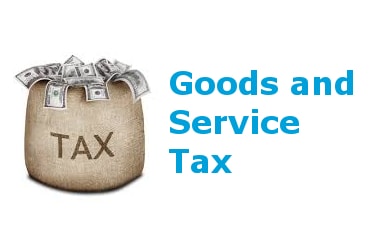 The Lok Sabha on 29 March 2017 passed four Goods and Services Tax (GST) Bills: The Lok Sabha on 29 March 2017 passed four Goods and Services Tax (GST) Bills:
- The Central Goods and Services Tax Bill, 2017 (The CGST Bill).
- The Integrated Goods and Services Tax Bill, 2017 (The IGST Bill).
- The Union Territory Goods and Services Tax Bill, 2017 (The UTGST Bill).
- The Goods and Services Tax (Compensation to the States) Bill, 2017 (The Compensation Bill)
These four Goods and Services Tax (GST) Bills will subsume all the indirect taxes currently levied such as the Value Added Tax (VAT), excise duty, service tax and central sales tax. It empowers the centre to impose an additional tax of up to 1 per cent on the inter-state supply of goods for two years or more. IGSTIGST Bill makes provisions for levy and collection of tax on inter-state supply of goods or services or both by the Union Government. CGSTThe CGST Bill makes provisions for levy and collection of tax on intra-state supply of goods and services by the Union Government. UTGSTThe UTGST Bill makes provisions for levy on collection of tax on intra-UT supply of goods and services in the Union Territories without legislature. SGSTUnion Territory GST is similar to States Goods and Services Tax (SGST), which shall be levied and collected by the States and Union Territories on intra-state supply of goods or services or both.
|
▼ MoPNG e-Seva: Dedicated platform for grievances redressal [03-29-17]
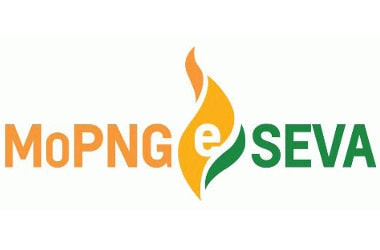 Union Minister of Petroleum and Natural Gas Dharmendra Pradhan on 24 March 2017 launched MoPNG e-Seva, a dedicated grievances redressal platform on Social Media for all queries and grievances relating to Oil and Gas Sector. Union Minister of Petroleum and Natural Gas Dharmendra Pradhan on 24 March 2017 launched MoPNG e-Seva, a dedicated grievances redressal platform on Social Media for all queries and grievances relating to Oil and Gas Sector.
The grievances will be dealt on real-time basis.
The MoPNG e-Seva portal will be a single point interface for all customers to reach out to the government for addressing their feedback or grievances related to Oil & Gas Sector on social media.
It will also deliver 24 x 7 support for consumers. It will serve as a single point for queries on Twitter and Facebook to begin with; and other social media platforms in due course.
A team of Nodal Officers from Oil Companies and Allied Services will be addressing the issues on real-time basis.
Conversations will be tracked on real-time basis and a standard operating procedure will be put into place for immediate intervention and closure by concerned officials of Companies.
It will also handle queries that are received on the official handles of Union Petroleum Minister and Union Petroleum Ministry.
For quick intervention and resolution of complaints, consumers can send their feedback or query with compulsory information like Full Name, Consumer ID, Location, Service Agency and Company
|
▼ GST Bills Introduced [03-29-17]
Finance minister Arun Jaitley on 27th March 2017 introduced four bills on the Goods and Services Tax (GST) in the lower house of parliament.
This is paving the way for the government to launch the landmark tax reform.
The bills introduced are the Central GST Bill, the Integrated GST Bill, the Union Territory GST Bill, and the GST (Compensation to States) Bill.
The state assemblies will also have to pass the State GST bill before the new tax system can be rolled out later this year.
The new tax, which the government expects to implement from July 1, is the biggest tax reform since India got independence in 1947 from the British colonial rule.
The tax is expected to boost the rate of economic growth by about 0.5 percentage points, broaden the revenue base and cut compliance cost for firms.
|
▼ SC: Aadhaar cannot be mandatory [03-29-17]
In a petition filed against GoI's move to make Aadhaar card compulsory for wide number of schemes, the SC on 27th March held that it cannot be made mandatory for availing benefits under the government welfare scheme.
The Apex Court in an earlier plea in 2015 had taken a similar stance.
The SC observation, however, did not rule out the possibility of Aadhaar being made mandatory for non-benefit schemes.
Aadhaar can't be mandatory for social welfare schemes but can be used for non-benefit schemes. Our earlier order is very clear.
You can't stop government from using Aadhaar for non-benefit schemes like Income Tax.
In October 2015 the SC had allowed voluntary use of Aadhar cards in welfare schemes including MGNREGA, pension and provident fund schemes.
A five-judge constitutional bench had back then put a caveat in its interim order for the government saying Aadhar card scheme will be voluntary till such time as it is finally declared to be otherwise by the court.
The government’s ambitious Aadhaar project has gained significant ground with nearly 112 crore people already on board.
Close to 50 percent digitally able people having their Aadhaar linked to bank accounts.
The project, believed to be somewhat like social security number in some developed countries, albeit not legally mandatory, now covers nearly 50 government schemes.
Recently, the government linked the mid-day meal scheme with Aadhaar even as it said those without the card would continue to benefit from the scheme.
Among non-welfare schemes, obtaining a driver's licence, getting a mobile phone connection, availing the employee provident fund and tax filing have all been brought under the Aadhaar ambit.
However, multiple petitions have been filed with the Apex Court concerning privacy of citizens considering data collection for issue of Aadhaar is done by private agencies.
SC: Know More - Established: January 28, 1950
- Authorized by: Constitution of India
- Chief justice: Jagdish Singh Khehar
|
▼ Survivors of suicide no longer to be prosecuted [03-29-17]
Suicide attempt survivors will no longer have to undergo prosecution, with the LS on Mach 27, 2017 passing the Mental HealthCare Bill 2016.
The bill decriminalises suicide and makes provisions for better healthcare for people suffering from mental illness.
Bill passed by RS with 134 official amendments in Aug 2016 was passed in the Lower House by voice vote as all parties assented to the bill.
Mental depression was discussed by the PM in his radio broadcast Mann Ki Baat on 26th March as well.
The bill gives legal rights to individuals to seek treatment for mental illness. Moreover, it decriminalises suicide attempts and identifies the caretakers.
It also curtails and punishes inhuman treatment or imprisonment to a person with persistent mental illness.”
As per this law, we cannot separate a child for three years.
Also, one cannot chain a mentally-ill person."
He clarified that the aim of the legislation is to see that the patient is protected and no coercive method is adopted.
BJP MP Ashwani Kumar Choubey suggested inclusion of music therapy as one of the remedies for mental treatment.
One of the features of the bill is that it allows adults to make an advance directive on how they wish to be treated in case they suffer from mental illness in future.
A person can also nominate a caregiver in such a case.
The bill clearly defines mental illness and mental healthcare as the earlier definition was vague.
There are also provisions preventing a person from being sterilised just because he or she is a mental patient.
The bill focuses on community-based treatment.
Special provisions for women and health have been provided for.
Among the various objectives, it provides for ensuring healthcare, treatment and rehabilitation of people with mental illness in a manner that doesn't intrude on their rights and dignity.
|
▼ North East Road Network Connectivity Project [03-27-17]
CCEA approved Phase 1 of the North East Road Network Connectivity Project.
The approval was given at the meeting of CCEA and under the project, 403 km of National Highways will be developed in Mizoram and Meghalaya.
Of the 403 km, around 52 km will be in Meghalaya and 351 km in Mizoram. The project will be executed in Engineering, Procurement and Construction mode.
Projects will be taken up for implementation during 2017-2018.
The project will encourage sub-regional social as well as economic development by improving infrastructure in Meghalaya and Mizoram.
It will also enhance the connectivity with inter-state roads and international borders.
The estimated cost is Rs 6,721 crore, including cost of land acquisition, resettlement and other pre-construction activities.
The project will be executed with assistance from the Japan International Cooperation Agency (JICA).
The JICA is a governmental agency that coordinates official development assistance (ODA) for the Government of Japan.
The existing carriageway of all the stretches in Meghalaya and Mizoram is varying between single lane to intermediate lane. A majority of these stretches is located in landslide areas and sinking zones.
JICA: Know More - Formation: October 1, 2003
- Type: Government agency
- Legal status: Active
- Purpose: Official development assistance
- Region served: Worldwide
- Official language: Japanese and English (secondary)
- President: Shinichi Kitaoka
|
▼ Centre to launch fertilizer subsidy reform [03-24-17]
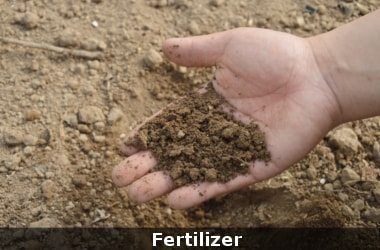 Centre has decided to roll out one of its biggest subsidy reforms across the country from June where fertilizer subsidies would be transferred to manufacturers on the basis of actual sales. Centre has decided to roll out one of its biggest subsidy reforms across the country from June where fertilizer subsidies would be transferred to manufacturers on the basis of actual sales.
This is a move which will pave the way for implementation of the direct benefit transfer (DBT) system in this sector and could save up to INR 7,000 crore by plugging leakages.
Though it will take some more time for the government to directly transfer subsidies to accounts of the end users (farmers), the June roll out will provide the government enough data through point of sale (PoS) machines having Aadhaar-based authentication system at retailers end.
It will aim to achieve its ultimate objective system of transferring benefits to farmers possibly after mid-2018.
The government has budgeted INR 70,000 crore for fertilizer subsidy in the current financial year.
Subsidies are currently paid to fertilizer companies on the basis of receipt of fertilizer at rail rake points or identified godowns in districts.
Once the new system is implemented from June, the manufacturers will get the difference between the actual value and the subsidized price of fertilizer in the companies bank account after giving actual details of sales through the PoS.
It will plug leakages and save huge amount of money to the exchequer.
Sales of neem-coated Urea have already stopped illegal diversion of fertilizer for non-agriculture applications like in plywood and textile sectors or for milk adulteration.
A soil health card scheme launched last year will help in determining the actual need of fertilizer but so far it has achieved only 40% of its target.
|
▼ New OBC panel set up [03-24-17]
The Centre has approved a proposal to set up a national commission for OBCs with constitutional status.
This is an initiative that carries the symbolic gesture of putting backwards on a par with scheduled castes and scheduled tribes.
The announcement, coinciding with the birth anniversary of Ram Manohar Lohia, a mascot for Mandal classes has the proposed OBC panel, to be named National Commission for Socially and Educationally Backward Classes.
It will be created through a constitutional amendment similar to the ones providing for national commissions for SCs and STs.
It will replace the National Commission for Backward Classes (NCBC) and will have the power of "grievance redressal" of backwards as exercised by the panels for SCs and STs.
The first big task before the new commission will be deciding the demand of Jats for OBC status.
In a departure from post-Mandal Commission paradigm, the Centre has proposed that Parliament will decide on inclusion and exclusion of communities in the central OBC list.
Currently, the Centre can simply issue a notification to change entries in the OBC list based on recommendations of the NCBC.
However, changes to the lists of SCs and STs can only be made through a legislation.
It has been a longstanding demand of OBC champions that the Mandal classes should get a separate constitutional identity , with its own grievance redressal mechanism.
The NCBC's mandate was limited to inclusion and exclusion of communities from the Central OBC list and OBC grievances were heard by the National Commission for SCs.
|
▼ Free WiFi for students in Bihar [03-24-17]
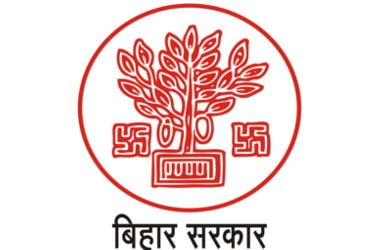 The Bihar government has launched an ambitious programme to provide free WiFi facilities in colleges and universities. The Bihar government has launched an ambitious programme to provide free WiFi facilities in colleges and universities.
Chief Minister Nitish Kumar formally launched free WiFi facilities for students on the occasion of Bihar Divas celebrations.
The objective is to provide free Wi-Fi facility to help youths to move ahead in life and to become digital smart.
Incubation centre is being established in different educational institutions in the state to help young entrepreneurs.
Start-up means an entity, incorporated or registered in Bihar not prior to five years with an annual turnover not exceeding INR 25 crore in any preceding financial year.
It should also be working towards innovation, development, deployment or commercialisation of new products, processes or services driven by technology or intellectual property.
Bihar: Know More
- Land area: 99,200 km²
- Population: 99.02 million (2012)
- Capital: Patna
- Sorrow: Koshi River
|
▼ Finance Bill 2017: Aadhaar mandatory for PAN [03-23-17]
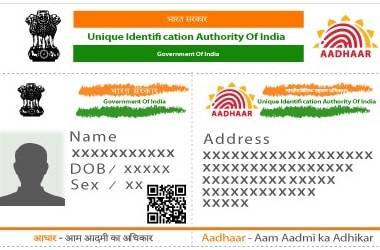 FM Arun Jaitley indicated on March 22nd that 18 lakh persons deposited funds higher than disclosed income levels; 8 lakh of these have responded to government queries through emails and SMSes. FM Arun Jaitley indicated on March 22nd that 18 lakh persons deposited funds higher than disclosed income levels; 8 lakh of these have responded to government queries through emails and SMSes.
Meanwhile LS passed the Financial Bill 2017 which has made the Aadhaar card mandatory for filing income tax returns or applying for a PAN (permanent account number) card.
GoI has also cut the limit for cash transaction to INR 2 lakhs from 3 lakhs proposed in the budget. The transaction will be illegal beyond the stipulated upper limit.
Aadhaar has been made mandatory for tax returns. Cases of individuals holding 5 PAN cards to evade tax have been noted. Around 98% of Indians have Aadhaar cards.
Agriculture is set to remain outside the taxation net.
Government has merged several administrative tribunals. It has also assumed powers to appoint and remove their chiefs, raising a question on the independence of quasi judicial institutions.
The bill has also allowed companies to make bigger, anonymous political donations. 8 autonomous tribunals have been merged with others and GoI now has the power to appoint and remove members in 17 such bodies.
The bill also laid down severance terms for chairpersons, vice chairpersons and members of merged tribunals. Up to 3 months pay and allowances are specified and officers will then revert to parent cadre, department or ministry.
Government indicated reducing the tribunals will increase dispute resolution and curb expenditure.
So far, a company could contribute 7.5% of three year average of net profits and had to disclose name of recipient political party. But now the cap is gone and companies don't need to disclose the names of beneficiaries.
Elections: Know More
- Voting system: First past the post
- Last election: 7 April – 12 May 2014
- Next election: Indian general election, 2019
|
▼ DGCI makes combination drugs easier to get [03-23-17]
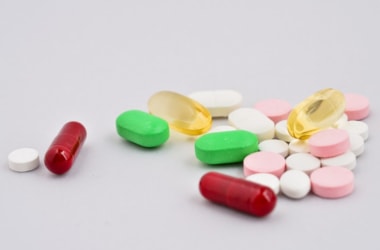 Aiming to make combination drugs for HIV and Hepatitis B and C available to patients rapidly, government has decided to waive the regulatory processes to fast track approvals. Aiming to make combination drugs for HIV and Hepatitis B and C available to patients rapidly, government has decided to waive the regulatory processes to fast track approvals.
India's top drug regulator has said in a new order that companies manufacturing combination drugs for HIV and Hepatitis B & C can seek early approval with a WHO recommendation even if internationally the medicines are not approved as a combination but only individually.
However, the drugs have to be relevant for India.
The move is expected to benefit many of the over 21 lakh people estimated to be living with HIV in India.
Moreover, viral hepatitis has also been recognised as a serious public health problem in India by the World Health Organisation (WHO) with a total of over 52 million people infected with chronic hepatitis in the country.
Out of this, 40 million people in India are chronically infected with Hepatitis B and 6 to 12 million people are chronically infected with Hepatitis C.
The regulator has also allowed leeway to manufacturers for conducting clinical trials or bio-equivalence studies in India.
While these studies are conducted to test new drugs on local patients, they take a long time and hence often delays launches in the country.
The new norms issued by the regulator allows companies to apply for such studies and product approvals simultaneously.
Till now, companies had to submit data from trials before seeking product approvals.
In fact, in some cases the regulator has also suggested waiving off clinical trials for urgent use.
HIV and Hepatitis In India: Know More
- Though India has demonstrated a 57% reduction in overall annual number of new HIV cases, it continues to have the third highest number of people living with HIV in the world.
- Similarly, chronic Hepatitis is placing a huge disease, social and economic burden on affected families as well as the health system.
- The condition can be self-limiting or can progress to liver fibrosis (scarring), cirrhosis or liver cancer.
- Early approvals in India are also likely to benefit people around the world as India is a major supplier of generic medicines, mainly anti-retroviral.
|
▼ India promotes bilateral cybersecurity cooperation [03-22-17]
 India is working with 15 countries for information exchange on cybercrimes and bilateral cooperation on tackling it. India is working with 15 countries for information exchange on cybercrimes and bilateral cooperation on tackling it.
India is working for bilateral cooperation with 15 countries for exchange of information and data pertaining to cyber crimes and related cooperation in law enforcement.
There is a steady increase in the government websites that have been hacked since 2014.
As per the information provided by MeITY, a total of 155, 164, 199 and 39 websites of certain ministries and departments as well as state governments were hacked in 2014 to 2017.
The government has constituted an Expert Group to study gaps and challenges in tackling cyber crimes in the country and prepare a road map for tackling and giving recommendations on all facets.
Cyber Crime Prevention Against Women and Children scheme: Know More
- CCWPC has been approved by the government
- It aims at setting up online cyber crime reporting platforms.
- It also works for cyber forensic training cum labs in states and UTs as well as R&D facilities and capacity building in law enforcement agencies against cyber crime across the nation.
- Indian cyber crime coordination centre 14C scheme has been placed for appraisal.
|
▼ HIV & AIDS (Prevention and Control) Bill passed [03-22-17]
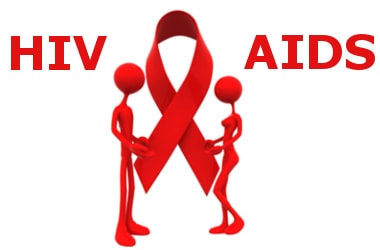 The HIV and AIDS (Prevention and Control) Bill, 2014, aimed at ensuring equal rights while seeking treatment, education and job by people living with HIV, was passed by the Rajya Sabha on March 21, 2017. The HIV and AIDS (Prevention and Control) Bill, 2014, aimed at ensuring equal rights while seeking treatment, education and job by people living with HIV, was passed by the Rajya Sabha on March 21, 2017.
The Bill also assumes significance as it protects such people from specific acts of discrimination by the state, or any other person.
It also lays down penal provisions for any discrimination practised against a person with HIV/AIDS and breach of confidentiality.
Under the Bill, central and state governments are obliged to provide for anti-retroviral therapy (ART) and management of opportunistic infections (infections that take advantage of weakness in the immune system and occur frequently).
The protection mandated in the Bill extends to the fields of employment, healthcare services, educational services, public facilities, property rights, holding public office, and insurance.
Though the Bill was initially introduced in the Parliament by the UPA government, the amendments to the HIV and AIDS (Prevention and Control) Bill, 2014 were revived by the Modi government in July 2016.
During the debate on the measure, many members suggested amending the Section 14(1) of the bill, to remove the phrase "as far as possible" for providing medical treatment by the Centre and the states to those infected with HIV and AIDS.
Rules will have provision to provide justification for denying treatment to the patients.
A large number of members were of the view that the phrase 'as far possible' would defeat the purpose of the bill as it provides a leeway to the Centre and the states.
Changes in the Bill
- Bill now makes anti-retroviral treatment a legal right for all HIV/AIDS patients.
- It has also adopted "test and treat" policy which means any person testing positive will be entitled for free treatment by the state and central government.
- Earlier, this was restricted by a CD4 count rate.
- It also provides for confidentiality of HIV-related information and makes it necessary to get informed consent for undertaking HIV tests, medical treatment and research.
- The Bill also provides for fast tracking of cases relating to HIV positive persons by courts on a priority basis.
- In any legal proceeding, if an HIV infected or affected person is a party, the court may pass orders that the proceedings be conducted (a) by suppressing the identity of the person, (b) in camera, and (c) to restrain any person from publishing information that discloses the identity of the applicant.
- When passing any order with regard to a maintenance application filed by an HIV infected or affected person, the court shall take into account the medical expenses incurred by the applicant.
|
▼ LS passes Railway Appropriation Bill [03-21-17]
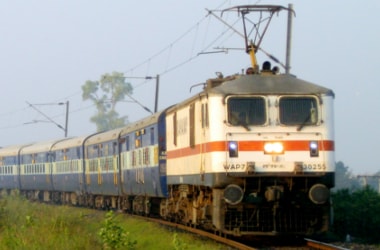 Lok Sabha passed the Railway Appropriation Bills and supplementary demands for grants this year. Lok Sabha passed the Railway Appropriation Bills and supplementary demands for grants this year.
The total proposed outlay for 2017-218 is INR 131,000 crore. This marks an 8 percent increase from the 2016-2017 budget estimate of INR 121,000 crore.
Railway revenue for 2017-2018 is estimated at INR 178,350 crore recording a 9 percent increase from revised estimates of 2016-2017.
The total revenue in 2016-2017 undershot budget estimates by INR 6300 crore.
The House also passed Railways supplementary demands for grants 2016-2017 and the demands for excess grants for 2013-2014.
Railway finances were presented along with the Union Budget. This is the first time since 1924 that the Railway Budget was merged with the Union Budget.
Lok Sabha: Know More
- Speaker: Sumitra Mahajan, BJP (Since 6 June 2014)
- Deputy Speaker: M. Thambidurai, AIADMK (Since 13 August 2014)
- Leader of the House: Narendra Modi, BJP (Since 26 May 2014)
|
▼ Pakistan gets a Hindu Marriage Bill [03-20-17]
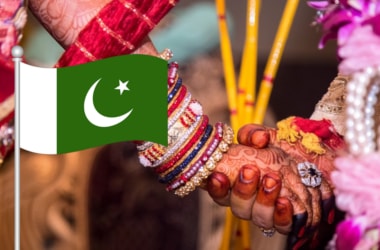 The law provides for the punishment of imprisonment and fines up to INR 100,000 or both for contraventions and all other offences to be tried in the court of the first class magistrate. The law provides for the punishment of imprisonment and fines up to INR 100,000 or both for contraventions and all other offences to be tried in the court of the first class magistrate.
This is the first law applicable to entire Pakistan except Singh province which has its own law to regulate the marriage of Hindus.
The law would be passed on March 10 by the National Assembly which has endorsed amendments made by the Senate in Feb 2017.
Sindh Province: Know More
- Area: 140,914 km²
- Population: 55.25 million (2011)
- Largest city: Karachi
- Interior minister: Syed Murad Ali Shah
|
▼ Small powerloom units get solar energy scheme [03-20-17]
 Union Minister of State for Textiles, Ajay Tamta on March 16, 2017 announced to the LS that the ministry has approved the Solar Energy Scheme for Small Powerloom Units. Union Minister of State for Textiles, Ajay Tamta on March 16, 2017 announced to the LS that the ministry has approved the Solar Energy Scheme for Small Powerloom Units.
The scheme will come into force on April 1, 2017. Scheme seeks to provide financial assistance in the form of capital subsidy to small powerloom units for installation of SPV/Solar Photo Voltaic plants.
These plants will overcome the problem of power cuts and shortages faced by decentralized powerloom units in the nation.
Under the scheme, the plants will have 2 options:
- On-Grid Solar Power Plant
- Off-Grid Solar Power Plant
On-Grid solar power plants in areas where the power cuts and shortages are negligible, involves high power tarrifs. Off-Grid Solar Power plants are involved in areas where there is power shortage and on-grid power is not constantly available. Some of the initiatives to promote the powerloom sector across the country seek to assist entrepreneurs in establishment of world class units with latest technology, modern infrastructure and suitable market linkages. The scheme was launched in two clusters - Bhiwandi (Maharashtra) and Erode (TN). In 2013-2014, the Modified Comprehensive Powerloom Cluster Development Scheme was launched to extend the original scheme to other parts of the nation. Guidelines of the scheme were issued in Oct 2013 by the Union Government with the objective of empowering the power loom industry and building capacity to meet challenges of international competition in a self reliant, sustainable way. The 5 components include market development programme, establishing common facility centres and organizing awareness programs, seminars and workshops. An SPV is set up to oversee the scheme implementation.
|
▼ e-Prisons: New software for prison reforms [03-20-17]
Modi government is pushing for implementation of prison reforms across the nation and the release of under trial prisoners in jails for longer than the number of years sentenced if convicted.
Union law ministry has asked states to migrate to the software, e-prisons to integrate prison data across the country; the aim is to roll out pending prison reforms and ensure release of under trials booked for petty crimes.
Of 4.18 lakh prisoners across the country, 67% or 2.82 lakh are under trials, many of them booked for petty crimes like theft.
Less than 1.28 lakh in jails are those who have been convicted and are serving their sentence.
The use of e-prisons software is for efficient management of the prison information system.
Gujarat, Odisha, Goa, Jharkhand and Haryana are just some of the states where maximum number of prisoners are under trials.
The states and UTs have shifted to this software, though some are still reluctant.
The special software updates prisoner's data along with information on the trial stage and period of sentence served if convicted.
Special software developed by the Centre was first test-checked successfully as a pilot in Tihar jail.
The software creates an alert when the under trial completes 50% of the prison term without bail for offences he has been charged with.
|
▼ Niti Aayog to start preparing a Water Management Index [03-20-17]
Niti Aayog will start a process to sensitise states towards preparing a Water Management Index which leads to the Centre's think tank to rank them on the basis of efforts in efficient water resource management.
State's performance will be judged on the basis of 28 basic indicators including water use efficiency, irrigation status, groundwater recharge, availability of water for rural and urban areas for drinking, water shed development and other sustainable practices in water based sectors.
Niti Aayog has developed a composite WMI to assess and improve performance in efficient water resource management.
Different weightage is allocated to different performance indicators to arrive at a composite index.
The scorecard carries both qualitative and quantitative indicators in 2016-2017.
The WMI is one of the six indices which the Niti Aayog has introduced for ranking states.
The others include health, education, energy efficiency , agricultural reforms and digital transaction.
|
▼ MTNL, BSNL to merge: Parliamentary Panel [03-20-17]
A parliamentary panel has suggested the merger of state-run telecom firms BSNL and MTNL for long term survival.
Committee on Petitions chaired by the BJP MP Bhagat Singh Koshyari in a report tabled in the LS on March 16, 2017 said the merger will be a positive move.
Synergies and advantages in an integrated national telecom infrastructure will pave the way for lower investment cost and greater ability to face competition.
Committee was formed after BJP MP Arvind Sawant received representation regarding service improvement in BSNL and MTNL.
The DoT informed the panel both public sector firms are facing financial resources and declining revenue on account of rising expenditure and loss of market share.
PSUs have not been able to adequately invest in expansion, modernisation of network on account of coverage issues.
Firms are now taking steps to modernise wireline and wireless networks.
MTNL has been unable to upgrade GSM and landline network for 3-4 years due to funds constraint.
Managed Service Model with BSNL is being explored for its mobile services.
|
▼ Queen Elizabeth II gives royal assent to Brexit Bill [03-17-17]
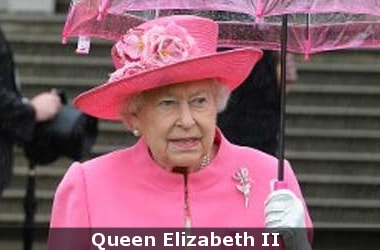 Queen Elizabeth II gave her royal assent on March 16, 2017 to a Bill empowering British Prime Minister Theresa May. Queen Elizabeth II gave her royal assent on March 16, 2017 to a Bill empowering British Prime Minister Theresa May.
The assent will permit the trigger Article 50 of the EU's Lisbon Treaty and begin the process of leaving the European Union.
A letter will be send European Council informing them of Britain's decision to leave the bloc by the end of March, following a majority vote for Brexit in last year's referendum.
The legislation now has royal assent.
The Queen's signature on the Bill allows May to invoke Article 50 at any time, starting a process that will take a maximum of two years unless Britain and its EU partners agree to extend the deadline.
May said she will address the British parliament to inform lawmakers that she has triggered Article 50, and an initial response is expected from the European Commission within 48 hours.
Lisbon Treaty: Know More
- Signed : 13 December 2007
- Signatories : EU Member States ( EU-27 )
- Effective : 1 December 2009
- Languages : 23 EU languages
|
▼ Government launches TIES for export linked infrastructure [03-17-17]
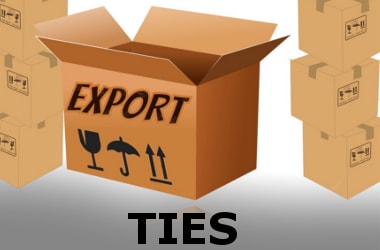 Government has launched a new scheme Trade Infrastructure for Export Scheme for developing export linked infrastructure in states to promote outbound shipments. Government has launched a new scheme Trade Infrastructure for Export Scheme for developing export linked infrastructure in states to promote outbound shipments.
Launched by Commerce and Industry ministry, TIES bridges the gap in infrastructure and provides forward and backward linkages to units in trade activities.
The Minister said the proposals of the implementing agencies for funding will be considered by an inter-ministerial empowered committee specially constituted for this Scheme to be chaired by the Commerce Secretary.
An empowered committee will be set up to periodically review the progress of the approved projects in the scheme.
The committee will also take the required steps to ensure that the objectives of the scheme are achieved.
The committee chaired by Commerce Secretary Rita Teaotia would also look over the proposals of the implementing agencies for funding.
The biggest cost incurred by the exporters is on account of the absence of proper dedicated infrastructure, whether it is testing or handling facilities or cold storages at ports.
TIES: Know More
- Scheme will oversee projects like checkpoints, first and last mile connectivity, border haats and integrated check posts, would help in ensuring smoother movement in export cargo and better quality standards and certification.
- The main objective of the scheme is to enhance export competitiveness by bridging the gap in export infrastructure, which has not been addressed by any other scheme.
- Under this scheme, all central and state agencies including Commodities Boards, SEZ authorities, Export Promotion Councils and Apex Trade Bodies recognised under the EXIM policy of Government of India will be eligible for financial support.
- The funding would be in form of grant-in-aid and in normal cases it would not be more than the equity being funded by the implementing agency or 50% of the total equity in the project.
- Five per cent of the grant approved would be used for appraisal, review and monitoring.
|
▼ Clean Ganga mission: 20 more projects approved [03-16-17]
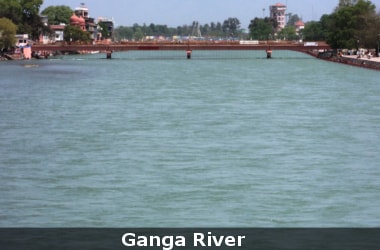 As part of the Clean Ganga mission, the Centre has approved 20 additional projects worth INR 1900 crore for UP, Bihar, Jharkhand, Delhi and Uttarakhand. As part of the Clean Ganga mission, the Centre has approved 20 additional projects worth INR 1900 crore for UP, Bihar, Jharkhand, Delhi and Uttarakhand.
The projects chiefly centre on setting up new STPs/sewage treatment plants, up gradation of existing STPs and laying sewage network in cities in the river basin.
Approved projects for Delhi include an STP at Okhla and pipelines in Pitampura and Kondli.
These projects were approved by EC of the National Mission for Clean Ganga on March 2, 2017.
The projects in the national capital come under NCMG approval. The central body deals with the Ganga river basin.
It covers the river and its tributaries including the Yamuna.
13 of the projects are in Uttarakhand.
A new sewage treatment plant is being set up in Haridwar as well. Other projects include 4 in Uttarakhand associated with pollution abatement works for Alaknanda.
For the Rishikesh project, a new MLD STP at Lakkar Ghat with online monitoring system has been approved.
|
▼ Karnataka launches Pratibimba to showcase schemes [03-10-17]
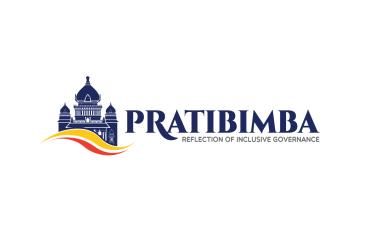 Karnataka Chief Minister Siddaramaiah on March 7, 2017 launched a comprehensive web-based platform showcasing the government’s performance and achievements to the citizens. Karnataka Chief Minister Siddaramaiah on March 7, 2017 launched a comprehensive web-based platform showcasing the government’s performance and achievements to the citizens.
It has been developed as the Chief Minister’s dash board.
'Pratibimba,’ which means reflection, will serve as a tool to improve efficiency in governance and allow citizens to track government’s progress.
‘Pratibimba” is a reflection of the growth story and development of the state, and the dash board will reflect the works of all the departments across flagship schemes, key programmes and projects undertaken in the state.
The dash board is available both in English and Kannada.
Karnataka is the second state in the country after Andhra Pradesh to have such a dash board,
The information on the dash board will be updated on 10th of every month.
Karnataka: Know More
- Area: 191,791 km²
- Capital: Bengaluru (Executive Branch)
- Population: 64.06 million (2014)
- Official bird: Indian roller
|
▼ Peace in the Home: New Commonwealth initiative to tackle domestic violence [03-8-17]
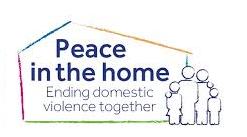 The Commonwealth is launching an initiative to help member states tackle domestic violence. The Commonwealth is launching an initiative to help member states tackle domestic violence.
The “Peace in the home” programme will include toolkits to help governments across the Commonwealth involve multiple agencies - such as schools, doctors and hospitals, as well as government - and law enforcement agencies to work together effectively.
It will help countries highlight and share details of initiatives that had been particularly successful at dealing with domestic violence.
There will also be a mentoring programme for women, and an initiative to address the issue of violence around elections and politics.
The programme, which is being launched on Women’s Day, will continue through till 2018, when there is expected to be an accord on ending domestic violence in the Commonwealth.
The secretariat would also launch an initiative to map the economic cost of domestic violence in Commonwealth countries, as well as focus on strengthening laws protecting women and girls across the group.
UN estimates one in three women has suffered from domestic violence.
Commonwealth: Know More
- The Commonwealth of Nations (formerly the British Commonwealth), also known as simply The Commonwealth.
- It is an intergovernmental organisation of 52 member states that are mostly former territories of the British Empire.
- GDP (nominal) : 2014 estimate
- Headquarters : Marlborough House , London
- GDP (PPP) : 2014 estimate
- Working language : English
|
▼ Now, smart mosquito to counter malaria [03-8-17]
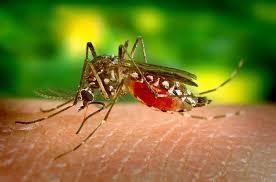 AP has sent a proposal for the deployment of a Smart Mosquito Density System to the Union Ministry of Urban Development. AP has sent a proposal for the deployment of a Smart Mosquito Density System to the Union Ministry of Urban Development.
Once approved, the system will be the first-of-its-kind project in the country.
Under the system, modern technologies will be deployed to detect mosquito breeding before malaria and other vector-borne diseases such as dengue, chikungunya and zika become an epidemic.
Initially, the system will be deployed in three urban local bodies of the State - Vijayawada, Vishakhapatnam and Tirupati.
Optical sensors will be fixed to electricity poles to capture density, species and gender of mosquitoes before moving in to exterminate them.
As per the initial proposal, around 10 sensors will be deployed per a square kilometre area.
On this basis, a total of 1,850 sensors will be deployed across 185 square kilometres of three cities.
The devices will analyse and transfer mosquito density data along with location to a central database. Special applications will be developed to prepare mosquito density heat maps based on the information received from sensors.
About the Project
- The Smart Mosquito Density System will operate autonomously and use state-of-the-art internet of things (IoT) technology.
- It will alert health and other agencies of emergencies.
- These thematic maps will help government agencies in prioritising sprays.
- The system will help the authorities in identifying breeding at exact location and that too with the right sprays for a particular species.
- Smart phones and web applications will be used to report sprays by location.
- There will be analytics to monitor the effectiveness of sprays.
|
▼ Swachh Shakti Saptah for women launched [03-3-17]
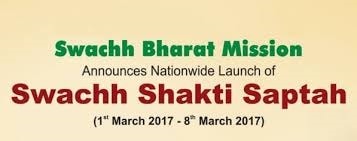 The national launch of 'Swachh Shakti Saptah' took place in Gurugram on March 1, 2017, in which Haryana chief minister Manohar Lal Khattar was the chief guest. The national launch of 'Swachh Shakti Saptah' took place in Gurugram on March 1, 2017, in which Haryana chief minister Manohar Lal Khattar was the chief guest.
Largely women sarpanches and other ladies from villages of all six districts of Gurugram division have been invited.
Besides, the persons contributing in Swachh Bharat Abhiyan (SBA) and organisations working in the field of sanitation were also invited.
He said that under the guidance of Prime Minister Narender Modi, the ministry of drinking water and sanitation decided to observe 'Swachh Shakti Saptah' throughout the country from March 1 and its launch is from Gurugram in Haryana.
The action plan for the entire week has also been chalked out. During the week, there will be a film or documentary on women and swachhta at district level, essay writing or painting or drawing competitions on girl child and sanitation and sports programmes for girls and women will be organised by involving government schools and colleges.
Panchayat Swachhta Rallies will be organised and exposure visits would be organised for women sarpanches for educating them to make their village Open Defecation Free (ODF).
Women Sammelan will be organised by involving women sarpanches, panches, anganwadi workers, ASHA workers, ANMs and self help groups. In the last women sanitation champions will be honoured.
|
▼ House of Lords vote to amend Brexit Bill [03-3-17]
UK’s upper house, The House of Lords voted on 2 March 2017 to amend the Brexit Bill.
This is thereby delaying the bill’s passing.
The members of the House voted 358 to 256 for an amendment that will require the ministers to protect the rights of more than three million European Union (EU) and European Economic Area (EEA) citizens living in the UK after it exits the EU.
The Brexit Bill will now have to return to the lower house, the House of Commons for further debate and deliberation.
However, since it was approved by a large majority in the lower house, chances are high that the house would reject the proposed amendment and send the original bill back to Lords.
This move does though delay the final approval of the bill just weeks ahead of Theresa May’s set deadline for triggering Article 50 of the EU’s Lisbon treaty.
On 23 June 2016, the citizens of UK voted to decide whether the UK should leave or remain in the European Union.
Almost 30 million people cast their vote to decide UK’s fate. The total turnout was around 71.8 per cent.
The final results saw 51.9 per cent votes in the favour of UK to leave EU and 48.1 per cent to remain.
The vote was fuelled by concerns of mass migration of people from the EU to Britain. May promised to end free movement of workers from the other 27 EU countries to Britain.
|
| Chronology of events |
|
Indian Railways launched the country’s first Antyodaya Express between Ernakulam (Kerala) and Howrah (West Bengal). Antyodaya Express is a long-distance, fully unreserved, superfast train service.
|
|
In its effort to make Namami Gange programme a mass movement with the involvement of more and more voluntary organisations, National Mission for Clean Ganga under Ministry of Water Resources, River Development and Ganga Rejuvenation signed an MoU with Rotary India in New Delhi on March 2, 2017.
|
|
The Union Minister of State for Finance and Corporate Affairs, Shri Arjun Ram Meghwal will represent the India in the 4th Annual Devolution Conference and will share the experience of devolution system and its progress in India.
|
|
The Union Minister of State (Independent Charge) for Development of North Eastern Region (DoNER), MoS PMO, Personnel, Public Grievances, Pensions, Atomic Energy and Space, Dr Jitendra Singh laid the foundation stone of 10 KW FM Radio Station at Malhar village in Udhampur district.
|
|
The West Bengal Government gave official language status to endangered tribal language Kurukh. The official language status was given to the endangered language by the state government in February 2017.
|
|
Nagpur, Indore, Surat, Vadodara and Udaipur are performing better in the implementation of smart city plans in comparison to other cities that have been selected for smart city project, according to an analysis by urban development ministry.
|
|
Prime Minister Narendra Modi will dedicate to the nation a Petrochemical Complex of ONGC Petro Additions Limited at Dahej, Gujrat.
|
|
The Prime Minister has inaugurated the 1.4 extra dose cable bridge on the Ahmedabad-Mumbai National Highway. The Four-Lane Extradoses Bridge over the Narmada at Bharuch on the National Highway 8, and Petrochemicals Complex of OPAL at Dahej to the nation. The 1.4 km bridge is reported to be the longest in the country.
|
|
The national conference on Jal Kranti Abhiyan was held in New Delhi organized by the Union Ministry of Water Resources, River Development and Ganga Rejuvenation.
|
|
On the occasion of International Women’s Day 2017, NITI Aayog, in partnership with the UN in India and MyGov, presented the second edition of Women Transforming India, an online contest to celebrate women achievers, leaders and change makers from across the country.
|
|
The Lok Sabha passed the Maternity Benefit (Amendment) Bill, 2016 on March 9, 2017. The Bill had already been passed by the Rajya Sabha during the Winter Session. It entitles the women working in the organised sector to paid maternity leave of 26 weeks, up from 12 weeks.
|
|
The Cabinet has approved a National Health Policy which will be the first such healthcare related policy that the government will approve since 2002.
|
|
India has fast-tracked hydropower projects worth USD 15 billion in Kashmir in recent months, three federal and state officials said, ignoring warnings from Islamabad that power stations on rivers flowing into Pakistan will disrupt water supplies.
|
|
The Arunachal Pradesh government has launched a new scheme ‘Adarsh Gram Yojana‘ that is in accordance with the basic philosophy of the Prime Minister ‘Sabka Saath Sabka Vikaas’.
|
|
Commerce & Industry Minister Smt. Nirmala Sitharaman introduced the Footwear Design and Development Institute (FDDI) Bill, 2017 in the Lok Sabha on 14th March, 2017 to declare the FDDI as an Institution of National Importance (INI).
|
|
The Union Cabinet has approved 2% additional Dearness allowance for Central government employees and Dearness relief for pensioners. It will be effective from 1 January, 2017.
|
|
Sanjauli Police Station in Shimla (Himachal Pradesh) has become the first police post in the country to be linked with Crime and Criminal Tracking Network & Systems (CCTNS).
|
|
Under the Centrally Sponsored Scheme of Atal Mission for Rejuvenation and Urban Transformation (AMRUT), an expenditure of Rs.1,673 cr will be incurred on improving basic urban infrastructure in 12 mission cities in Telangana by 2019-20, the last year of the mission.
|
|
The Union Labour Ministry has proposed a labour code which will provide social security cover to the entire workforce in the country, including self-employed and agricultural workers.
|
|
India’s longest surface tunnel in Jammu and Kashmir’s Udhampur district is complete. It will be open to traffic soon, following successful completion of trial runs for peak and off-peak hours. The tunnel is 9 km long.
|
|
The Assam state cabinet has decided to implement the recommendation of the Seventh Pay Commission. The implementation will make state exchequer bear an additional burden of over INR 3000 in the next financial year and the proposed pay structure would come into effect from 1 April 2016.
|
|
The Cabinet Committee on Economic Affairs has given its approval for development of 403 kms of National Highways in Meghalaya and Mizoram. Out of 403 km, approximately 52 kms will be in Meghalaya and 351 km in Mizoram.
|
|
Cabinet approves proposal for Amendments to the NABARD Act, 1981
|
|
Department of Agriculture, Cooperation & Farmers Welfare (DAC&FW) conducted a study to determine the impact of Neem Coated Urea that clearly demonstrates the benefits of the of the scheme.
|
|
The two day workshop on Trade Facilitation in Services organised by the World Bank Group in partnership with the Department of Commerce, Ministry of Commerce and Industry concluded on 25th March 2017.
|
|
The Ministry of AYUSH has implemented a programme ‘Homeopathy for Healthy Child’ (HHC) through Central Council for Research in Homoeopathy (CCRH), an autonomous organization under Ministry of AYUSH. The programme has been undertaken on pilot basis in ten blocks of six districts in five states of the country. The program is also extended in two blocks of Jharkhand and Rajasthan under tribal sub-plan. The program has 2 components namely, ‘Homoeopathy for teething complaints in children.
|
|
Shri J P Nadda launched new initiatives to combat TB ; National Strategic Program (NSP) will be finalised in one month and will be rolled out across the country.
|
|
Minister of State (I/C) for Petroleum and Natural Gas, Shri Dharmendra Pradhan launched MoP&NG e-Seva, a dedicated grievances redressal platform on Social Media for all queries and grievances relating to Oil and Gas Sector.
|
|
The Swadhar Greh Scheme is under implementation w.e.f. 01.01.2016 after merger of the two earlier schemes viz. Swadhar and Short Stay Home.
|
|
Railways to set up Wi-Fi hotspot kiosks at 500 stations Christened as Railwire Saathi, the Wi-Fi kiosks will function like a PCO for Digital India and enable people to use services like e-commerce, online banking, offer them access to open school/university and insurance schemes, e-ticketing.
|
|
“Rashtriya Vayoshri Yojana”, a ‘Scheme for providing Physical Aids and Assisted-living Devices for Senior citizens belonging to BPL category’ will be launched in District Nellore, Andhra Pradesh on 1st April, 2017.
|
|
The Centre has approved for introduction of The Indian Institutes of Information Technology (Amendment) bill, 2017 in Parliament.
|
|
The Rajya Sabha on 22 March 2017 passed the Employee’s Compensation (Amendment) Bill, 2016. The amendment bill, which was passed by the Lok Sabha on 9 August 2016, seeks to amend the Act, 1923.
|
|
Parliament has passed Finance Bill 2017 after Lok Sabha negating all the five amendments made by the Rajya Sabha.
|
|
Union Railway Minister Suresh Prabhu inaugurated high speed rail wire Wi-Fi facility in National Rail museum, New Delhi. It is free Wi-Fi service built over the fibre network.
|